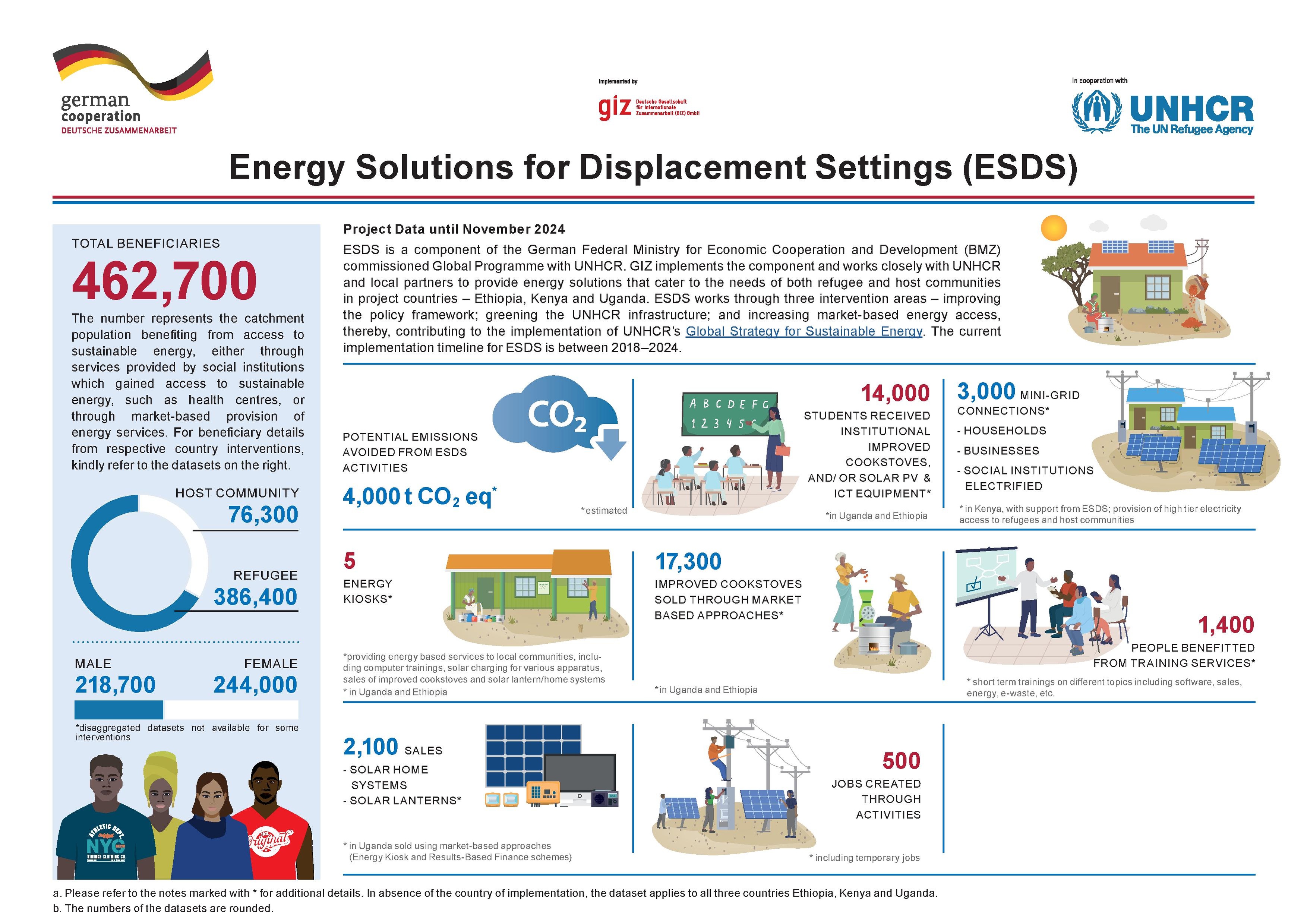Difference between revisions of "Sandbox"
***** (***** | *****) m Tag: 2017 source edit |
***** (***** | *****) m Tag: 2017 source edit |
||
| Line 93: | Line 93: | ||
<gallery mode="slideshow"> | <gallery mode="slideshow"> | ||
| − | File:NAZ 1322.jpg|alt=Table for charging mobile phones which was made at the innovation centre at Ofua 3 Primary School, Uriama Sub-County in Terego District.|Source: © GIZ/Malaika Media and Nazil Muzungu. | + | File:NAZ 1322.jpg|alt=Table for charging mobile phones which was made at the innovation centre at Ofua 3 Primary School, Uriama Sub-County in Terego District.|Table for charging mobile phones which was made at the innovation centre at Ofua 3 Primary School, Uriama Sub-County in Terego District. Source: © GIZ/Malaika Media and Nazil Muzungu. |
File:Sauda Meli watches television.jpg|alt=Sauda Meli watches television with her children at her home in Kalobeyei Village 1. The advent of the mini grid has enabled households in the area to access lighting and power at affordable rates.|Source: © GIZ/James Ochweri. | File:Sauda Meli watches television.jpg|alt=Sauda Meli watches television with her children at her home in Kalobeyei Village 1. The advent of the mini grid has enabled households in the area to access lighting and power at affordable rates.|Source: © GIZ/James Ochweri. | ||
Revision as of 12:18, 17 June 2022
ESDS Project
Improving the Policy Framework
We work together with policy makers to create the necessary framework conditions to implement the GCR and ensure sustainable energy access for refugees and host communities at a national, regional and district level.
Greening Social Infrastructure
We advise UNHCR to solarize its infrastructure via market-based approaches and implement energy efficiency measures to reduce its diesel consumption.
Increasing Market-based Energy Access
We promote markets for sustainable energy products and services for refugee and host communities in collaboration with UNHCR and private sector actors.
The project teams of ESDS work towards these objectives in selected regions in the three partner countries Ethiopia, Kenya and Uganda in collaboration with UNHCR and local and national authorities. ESDS has teams in each country which implement activities on the ground and are supported by the Global-team based in Germany that coordinates all measures and aligns them to each other. As the Clean Energy Challenge Baseline Data Visualization shows, the given conditions regarding access to sustainable energy for refugees and host communities differ in the three project-countries, translating itself into context-specific activities whose scope vary for the countries. The three intervention areas constitute however the overall and common framework.
=> Click here for a detailed overview of the project!
Regional Focus

Ethiopia
Project Area: Gambella Region
- Improving the Policy Framework: Support UNHCR in implementing its cooking fuel strategy and improve framework conditions for energy access to refugees and host communities
- Greening Social Infrastructure: Advise UNHCR in reducing diesel-consumption and solarizing camp infrastructure via market-based models
- Increasing Market-based Energy Access: Promote sustainable energy products among households through advertisement campaigns, energy kiosks and financing schemes, and assist in incentivizing companies to operate in camps

Kenya
Project Area: Turkana County
- Improving the Policy Framework: Strengthen capacities of Turkana County government to implement renewable energy solutions for refugees and host communities
- Greening Social Infrastructure: Solarize and upscale existing mini-grids for sustainable high-tier electricity access for households, institutions and UNHCR

Uganda
Project Area: West Nile Region
- Improving the Policy Framework: Assist in implementing the national Sustainable Energy Response Plan and strengthen capacities of local administrations
- Greening Social Infrastructure: Advise UNHCR in reducing diesel-consumption and solarizing camp infrastructure via market-based models
- Increasing Market-based Energy Access: Promote market-based access to sustainable energy through advertisement campaigns, energy kiosks and flexible payment schemes, and assist in incentivizing companies to operate in camps
 Global
Global
In cooperation with the country-offices
- Offer advisory services for stakeholders
- Perform concept development, project management and knowledge generation
- Coordinate technical assessments, market studies and pilot projects
Partners
GIZ's Energy Solutions for Displacement Settings (ESDS) project cooperate with UNHCR to enhance the access to sustainable energy in displacement contexts, and the Energypedia page has been created to share learnings across various practitioners to spur the development of clean energy solutions.

ESDS Factsheets
ESDS Webinars
- Collaborating for Change: Lessons from the SUN-ESDS Project
- Webinar Experiences on Operation and Maintenance in Displacement Settings
- Ewaste Value Chain in Humanitarian Settings
- Role of Energy Policies in Shaping Energy Access Dialogue in Displacement Contexts
- Access to Energy for Cooking in Displacement Settings
- Energy Efficiency in Humanitarian Organization Infrastructure
- Workshop on Participatory Design Processes for Energy Projects Planning and Implementation























